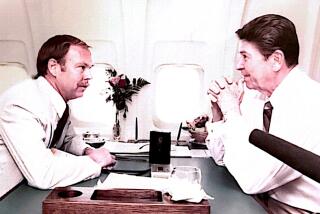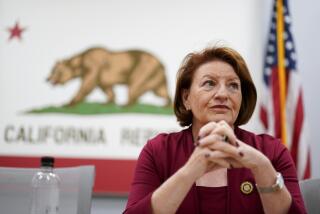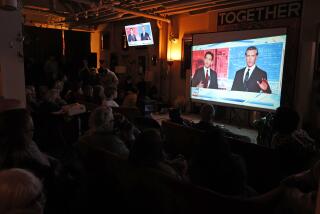Op-Ed: Handicapping California’s celebrity-free governor’s race
When Ronald Reagan and Arnold Schwarzenegger ran for governor, they both benefited from celebrity. Who in the voting booth didn’t recognize their names?
This California primary season, none of the eight remaining candidates for governor is a movie star. Still, right from the start, Lt. Gov. Gavin Newsom, who was mayor of San Francisco, and Antonio Villaraigosa, the former mayor of Los Angeles, enjoyed a clear advantage in terms of having a high profile.
That isn’t a strike against them. But as we are all living with the fallout of having a reality TV star crush his Republican rivals in the 2016 presidential primaries, I resolved this primary cycle to look closely at candidates whose qualifications didn’t include already being famous.
I began asking the keenest observers I could find: Who has experience, a good reputation and incisive thoughts on how to improve California? Who would most improve primary season debates if only their voice was more prominent?
I intended to identify one Republican and one Democrat. I’d tell you about the Republican from the South Bay who impressed me over lunch, but he dropped out two weeks after officially entering the race. Oh well. Republicans can’t win at the state level here anyway.
California is wildly diverse. It deserves leaders who acknowledge all the good-faith disagreements among us.
Among Democrats, the name that kept coming up was John Chiang. A Public Policy Institute of California poll earlier this month has him stuck at 6% of voters, behind not only Newsom (28%) and Villaraigosa (12%), but also Republicans John Cox (14%) and Travis Allen (10%).
The son of immigrants from Taiwan, Chiang, 56, is more experienced in state government than his better-known Democratic rivals, and refreshingly inexperienced in the kinds of scandals that they have endured. If he is relatively unknown, that is in part because his successive stints as state controller and state treasurer unfolded without any misconduct or incompetence. Isn’t that boring?
On one of his many stops on his campaign tour around the state, I met Chiang for coffee in Long Beach. I was impressed. He possessed a quality I’d never encountered in years of talking to state and local politicians. Asked for their position on a given topic, candidates typically deliver a more-or-less polished statement of their poll-tested position. Occasionally they’ll attack a rival.
But when I asked Chiang about California’s housing crisis, its transportation infrastructure and its energy needs, that’s not what I got. Instead, he presented a sophisticated summary of the concerns of different stakeholders. Then he acknowledged the trade-offs inherent to different solutions. Only after all that did he declare where he came down and why, emphasizing that compromising on any meaningful improvement would be better than doing nothing while a crisis worsened.
I agreed with some of his positions and disagreed with others. But I was uniformly confident that he had worked to consider the beliefs of all the constituents he seeks to represent. That’s a rare quality. California is wildly diverse. It deserves leaders who acknowledge all the good-faith disagreements among us. Too often, politicians talk as if their own position is held by all good people.
In short, he didn’t rely on smoothness or charisma or bluster. Instead, he’d done his homework, an approach that comes across in his record in office and in longer conversations, but that might be lost in TV sound-bites or campaign commercials.
That doesn’t mean he has won my vote, fond as I am of his instinct to spend so little time playing the talking head game on cable news. I’m still studying the issues and watching the campaign play out. But in a lifetime of observing Golden State politics, I have never seen a bigger gulf between the amount of attention a candidate warrants and what Chiang is getting. Whether you’re a Republican, a Democrat, or an independent like me, you’re simply not informed about all of the strongest options for the June 5 open primary until you’ve studied the candidate whose biggest weakness is his lack of fame.
Indeed, one gets the feeling that he’d be the anti-Donald Trump in the governor’s mansion: We’d rarely have cause to think of him, because he aspires to do the work of governing rather than gratifying himself by getting our attention. Is vanity now necessary for victory? I hope not. Never has low-key sounded nicer.
Conor Friedersdorf is a contributing writer to Opinion, a staff writer at the Atlantic and founding editor of the Best of Journalism, a newsletter that curates exceptional nonfiction.
Follow the Opinion section on Twitter @latimesopinionand Facebook.
More to Read
A cure for the common opinion
Get thought-provoking perspectives with our weekly newsletter.
You may occasionally receive promotional content from the Los Angeles Times.






